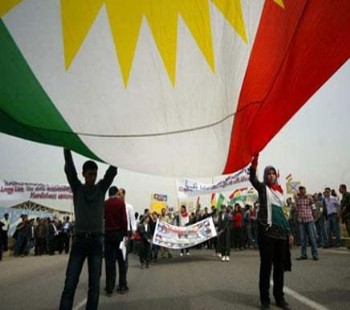
By Christian Sinclair & Sirwan Kajjo:
Over the weekend of July 16-17, representatives of the opposition to the regime of Syrian President Bashar al-Asad met in Istanbul to choose a “National Salvation Council.” Among the diverse attendees were delegates speaking for Syria’s Kurds, the largest ethnic minority in the country at more than 2 million people, some 10 percent of the population. All of the multiple Kurdish parties in Syria envision a pluralistic state in which their cultural and linguistic rights are recognized. Those at the Istanbul gathering wanted the name of the country changed from the Syrian Arab Republic to the “Republic of Syria.” When the other delegates at the conference refused this request, these Kurds walked out in protest.
Some may have been surprised to learn that there are Kurdish parties in Syria at all. Pending promised revisions, or the collapse of the present regime, Article 8 of the Syrian constitution outlaws all political parties but the ruling Baath and its coalition partners. But opposition parties do exist, and Kurdish parties have been around since 1957. In the 54 years since the founding of the first one, the Kurdish political landscape has evolved and matured — albeit on the sidelines, since much of the activity has been covert. Parties have split, and split again, with amoeba-like efficiency; they have died just as quickly. Today there is no accurate count of the parties or their members. Membership is a closely guarded secret, in fact, with only 2-3 percent of the members known outside party circles. [1] Most observers, however, believe there are 15 parties, with estimates of total membership ranging from 60,000 to 200,000. The higher numbers come from Kurdish party officials. If they do not exaggerate, then the party members all together would make up about 10 percent of the Kurdish population.
For most of their history, Kurdish political formations in Syria have run up against the precepts of Arab nationalism. The Kurds, with their different language and customs, and their ties to ethnic brethren in Turkey, Iraq and Iran, have been seen as a threat to the project of Arab unity. In 1957, just one year before implementation of the short-lived union between Syria and Egypt as the United Arab Republic, the power of Arab nationalist ideology was near its zenith. The founding of the first Kurdish party came, in part, in reaction to this state-sponsored program, which aimed to submerge the Kurds in Arab culture. The reactions of Arab oppositionists to the Kurdish platform in Istanbul show that old ideas of Arab nationalism retain considerable purchase. A new Syria is destined to emerge, however, from the months of upheaval engulfing the country in 2011. If that Syria is to be more democratic, Kurdish aspirations will have to be integrated into the broader spectrum of the country’s politics, moving the Kurds from the sidelines onto the field.
This article was recently published by the Middle East Research and Information Project. We are publishing these introductory paragraphs to whet readers’ appetites: you can read the article in full here: The evolution of Kurdish politics in Syria
.jpg)


